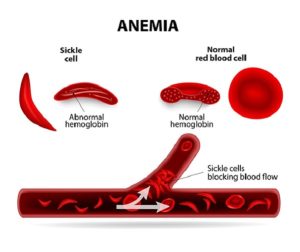Sickle cell disease (SCD) is a genetic disorder that affects millions of people worldwide, primarily those of African, Middle Eastern, Mediterranean, and Indian descent. It is essential to be informed about this condition, its impact, and the available treatments to support individuals living with SCD and promote better public awareness.
In Uganda alone, statistics suggest that at least 15,000 babies per year are born with sickle cell disease.
Here’s what you should know about sickle cells:
Genetics: Sickle cell disease is inherited in an autosomal recessive pattern, meaning that a person must inherit two abnormal copies of the haemoglobin gene (one from each parent) to develop the disease. These abnormal genes cause red blood cells to form a sickle or crescent shape instead of their typical round shape. The abnormal red blood cells are fragile, leading to various complications.
The Symptoms: Individuals with sickle cell disease often experience symptoms like severe pain, fatigue, and anaemia. The misshapen red blood cells can get stuck in blood vessels, obstructing blood flow and causing pain crises known as sickle cell crises. These crises can occur in different parts of the body and may vary in intensity and frequency.
Complications: Sickle cell disease can lead to various complications due to reduced oxygen supply and blood flow. Some of these complications include strokes, organ damage, infections, acute chest syndrome, and delayed growth in children. The severity of the condition varies from person to person, with some experiencing milder symptoms while others face more frequent and severe crises.
Diagnosis and Screening: SCD is typically diagnosed through newborn screening, which has become a standard practise in many countries. Early detection is crucial to providing appropriate medical care and support at an early age.
Treatment Options: While there is no cure for sickle cell disease yet, advances in medical science have improved the management of the condition. Treatments aim to alleviate symptoms, prevent complications, and improve the quality of life for individuals with SCD. Blood transfusions, pain management, and the use of hydroxyurea are common therapeutic approaches. Bone marrow or stem cell transplants can offer a potential cure for some patients.
Lifestyle Management: Individuals living with sickle cell disease can take certain measures to reduce the frequency and severity of sickle cell crises. Staying hydrated, avoiding extreme temperatures, getting enough rest, and managing stress can all help. Regular medical check-ups and vaccinations are also vital to prevent infections and monitor overall health.
According to Dr. Musinguzi Ronald of Alpine Medical Centre, it is advisable for partners to do sickle cell screening and testing to know their status.

“In the battle against sickle cell disease, knowledge and awareness are powerful allies.” Dr. Musinguzi said.
“It is important to know if you have sickle cell trait because it means you and your partner may require genetic counselling prior to having a child together,” Dr. Musinguzi added.
Sickle cell disease is a significant health concern that affects millions of people worldwide. Understanding the genetic basis, symptoms, complications, and available treatments is crucial to supporting those living with the condition and promoting a better quality of life. By fostering awareness, advocating for research, and providing adequate medical care, we can work towards a future where sickle cell disease no longer poses a significant burden on affected individuals and their communities.
